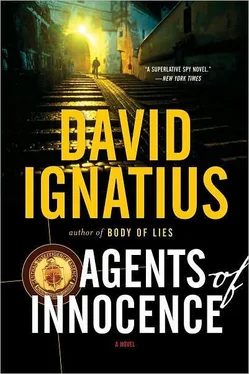David Ignatius - Agents of Innocence
Здесь есть возможность читать онлайн «David Ignatius - Agents of Innocence» весь текст электронной книги совершенно бесплатно (целиком полную версию без сокращений). В некоторых случаях можно слушать аудио, скачать через торрент в формате fb2 и присутствует краткое содержание. Жанр: Шпионский детектив, на английском языке. Описание произведения, (предисловие) а так же отзывы посетителей доступны на портале библиотеки ЛибКат.
- Название:Agents of Innocence
- Автор:
- Жанр:
- Год:неизвестен
- ISBN:нет данных
- Рейтинг книги:3 / 5. Голосов: 1
-
Избранное:Добавить в избранное
- Отзывы:
-
Ваша оценка:
- 60
- 1
- 2
- 3
- 4
- 5
Agents of Innocence: краткое содержание, описание и аннотация
Предлагаем к чтению аннотацию, описание, краткое содержание или предисловие (зависит от того, что написал сам автор книги «Agents of Innocence»). Если вы не нашли необходимую информацию о книге — напишите в комментариях, мы постараемся отыскать её.
Agents of Innocence — читать онлайн бесплатно полную книгу (весь текст) целиком
Ниже представлен текст книги, разбитый по страницам. Система сохранения места последней прочитанной страницы, позволяет с удобством читать онлайн бесплатно книгу «Agents of Innocence», без необходимости каждый раз заново искать на чём Вы остановились. Поставьте закладку, и сможете в любой момент перейти на страницу, на которой закончили чтение.
Интервал:
Закладка:
“Nothing,” said Hoffman. “Except that the story is total bullshit.”
“It is?”
“Yup! ‘C’ lost his leg in a car wreck all right, but he didn’t cut it off himself. That’s a legend the Brits have been circulating for fifty years. Stone tells it to everybody. It’s his favorite story. But it ain’t true. So wise up. Nobody’s perfect. Not ‘C’. Not Stone. Not you.”
Rogers shook his head. He had no idea who was telling the truth: Stone, Hoffman, or perhaps, neither of them.
“Do you want my advice?” asked Hoffman.
Rogers didn’t answer.
“My advice is, fuck ’em. The whole lot of them.”
“That’s helpful,” said Rogers.
“Seriously,” said Hoffman. It was a word Rogers hadn’t heard him use. “I think you need a break from the Palestinian account. Change of scene. Catch your breath. Forget about how your colleagues in the front office are mistreating you. Let them screw things up for a while. How does that sound?”
“I don’t want a vacation, if that’s what you’re asking.”
“Look, smart ass, if you think I can spare my best man just because he’s having an identity crisis, forget it.”
Rogers’s face showed a flicker of interest.
“What I had in mind,” continued Hoffman, “was that you spend some time on the other side, in East Beirut with the Christians. Prowl around. Make some contacts. See what’s out there. Something’s going on with them, or my name isn’t Nathan M. Pusey.”
“Like what?” Rogers asked.
“Like some kind of secret underground movement.”
“What in the world does that mean?”
“If I knew, I wouldn’t need you, would I?”
“Don’t you already have people on that account?”
“Second-raters.”
“I don’t know,” said Rogers, still wary.
“Well, I do! Anyway, it isn’t a suggestion. It’s an order.”
“Yes, sir,” said Rogers. As he spoke, he was already making a mental inventory of what would be necessary for the task Hoffman had described.
“I’ll need access to the files. And I’ll need to know who’s already on our payroll, so we don’t buy the same people twice.”
“Permission granted,” said Hoffman.
“Thank you.”
“But I can save you a lot of trouble by telling you the simple truth, which is that our agents in East Beirut are a bunch of flaming assholes who are good at only one thing, which is stealing money.”
“So where do I begin?”
“If it were me,” said Hoffman, “I would begin with our esteemed colleague in the Lebanese Deuxieme Bureau, General Fadi Jezzine.”
“Why him?” asked Rogers. His image of General Jezzine, from dinner at the ambassador’s house months ago, was of an elegant, austere man in a tuxedo who seemed, to Rogers, to typify the political and economic system that was strangling Lebanon.
“Because the general knows where all the bodies are buried on the Christian side,” said Hoffman.
“Who owns a piece of him?”
“Everybody,” answered Hoffman. “And nobody. The good general sells information to us, the Israelis, the Syrians, the Egyptians. He’s a regular supermarket. He’s got something for everyone. Which means he’s never completely in the bag for any one customer. What’s more, he understands the first rule of the intelligence business.”
“Which is?”
“Which is: Don’t give anything away for free. When you have a piece of information, sell it, or trade it. But don’t give it away.”
“How am I going to get anything new out of him?”
“That’s your problem,” said Hoffman. “By the way, if you strike out with the general, try his wife. She’s a firecracker.”
“I know.”
“You know the lady?”
“Slightly,” said Rogers. “I sat next to her one night at a dinner party when she got drunk and denounced the Palestinians.”
“Excellent.”
Rogers turned and began to walk out of the office.
“Guadeamus igitur!” called out Hoffman.
“What does that mean?” asked Rogers.
“Let us make merry.”
21
East Beirut; July 1970
Rogers embraced the new assignment as if he was starting a new life. He spent his days in East Beirut, among the Christian elite, making new contacts and renewing old ones. Several weeks after his conversation with Hoffman, he had wangled an invitation to lunch at the Jezzines’ house in the mountains northeast of Beirut.
The luncheon took place on a bright summer day that seemed hot when Rogers left his apartment in West Beirut. He was dressed casually, in a light summer suit and open-necked shirt, and his cowboy boots. When he reached the mountains near the Jezzines’ village, the air was chillier and Rogers wished he had brought a sweater.
The village, on the slopes of Mount Lebanon, had been tidied up for the arrival of a special visitor. There was a string of lights across the main street, shining dully and almost invisibly at midday, and Lebanese flags were fluttering from many of the stone houses. As Rogers drove down the road, he noticed that in the windows of some of the houses were faces, staring silently at him.
The village was the ancestral home of the Jezzine clan. Their villa sat atop the highest hill, sheltered in a grove of cedar trees. As Rogers neared the house, he saw a barricade ahead in the road. It was manned by peasant boys dressed in black and carrying automatic weapons. They stopped him, asked to see his passport. When they had established that he was the important American vistor who was expected that day, the gunmen insisted on driving Rogers the remaining one hundred yards to the house.
The Jezzines kept him waiting, inevitably. Rogers amused himself smoking cigarettes and reading the magazines from Paris on the table in the salon. Eventually, precisely thirty minutes after Rogers had arrived, General Jezzine emerged from the private quarters of the mansion to greet him. The general was dressed in a white linen suit and smoking a Havana cigar.
“How good of you to come,” said Jezzine. “It is an honor to have a distinguished member of your organization in my home.” His voice was precise and measured. He had a way of talking that allowed his mouth to form words while the rest of his face remained utterly immobile. Especially his eyes, which seemed to stare at Rogers without blinking.
They made small talk for a few minutes. Jezzine showed Rogers his collection of guns, mounted in a case on the wall. Then he strolled to the large picture window that dominated the salon and pointed out, in the distance, the valley where he had hunted with his father when he was a boy, and where he now hunted with his own sons. The general glanced momentarily at Rogers’s boots and looked away in disdain.
A servant eventually arrived with tea, served in small glass cups that were half-full with sugar.
“Have you ever heard of ‘Le Dactylo,’ Mr. Rogers?” asked the general, sipping his tea.
Rogers shook his head.
“It means ‘The Typewriter’ in French. But here in my country it has a special meaning. Do you perhaps know what that is?”
“I do not,” said Rogers.
“It is a nickname that Lebanese journalists have for the Deuxieme Bureau. The name has a certain logic. Sometimes, you see, I will summon the owner of one of the Lebanese newspapers to my office in Yarze, and I will give him a bit of information. I will say that the bank owned by Mr. So-and-so, the Palestinian millionaire, is in trouble, or that a particular ministry has exceeded its budget because of financial irregularities. The newspaper owner, if he is a sensible man, will take this information to his editor and tell him to run it in the newspaper. If the editor asks where it came from, the owner will say: ‘Le Dactylo.’ ”
Читать дальшеИнтервал:
Закладка:
Похожие книги на «Agents of Innocence»
Представляем Вашему вниманию похожие книги на «Agents of Innocence» списком для выбора. Мы отобрали схожую по названию и смыслу литературу в надежде предоставить читателям больше вариантов отыскать новые, интересные, ещё непрочитанные произведения.
Обсуждение, отзывы о книге «Agents of Innocence» и просто собственные мнения читателей. Оставьте ваши комментарии, напишите, что Вы думаете о произведении, его смысле или главных героях. Укажите что конкретно понравилось, а что нет, и почему Вы так считаете.












